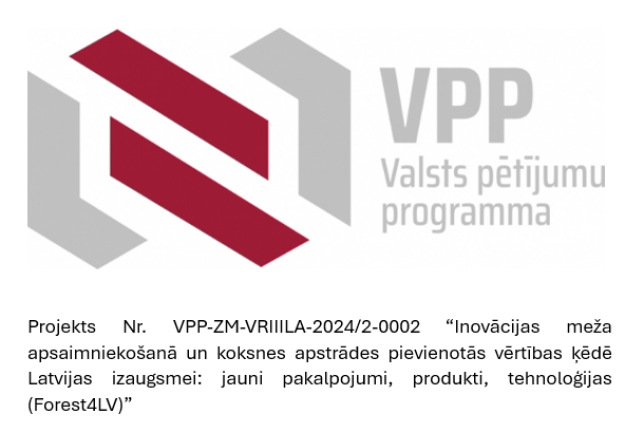Innovations in Forestry and Perspectives on Sustainable Use: Forest4LV 8-Month Progress Seminar

On May 14, 2025, the Latvian State Institute of Wood Chemistry (LSIWC) hosted the 8-month progress seminar of the National Research Programme (NRP) Forest4LV. The event highlighted significant advancements in forest resource research, sustainable utilization, and the development of innovative materials, emphasizing interdisciplinary collaboration among scientists, industry stakeholders, and forestry practitioners.
The goal of the Forest4LV project is to promote innovative forest management in Latvia and to develop new forest services, products, and technologies. As part of the project, a socio-economic evaluation of forest management scenarios is also being conducted. This assessment is based on stakeholder involvement and includes the potential for climate change mitigation. The proposed solutions focus on the rational use of forest resources in processing and biorefining.
The project also addresses innovative approaches in wooden construction, the enhancement of forestry value chains, and the development of technologies for producing bioactive substances, chemical compounds, and polymer materials. A key component of the project is the education of young researchers on how to holistically assess the impacts across the entire value chain—from forest to final product.
The leading partner and coordinator of Forest4LV is the Latvian State Institute of Wood Chemistry (LSIWC). The project is led by Dr.sc.ing. Uģis Cābulis, with the LSIWC work package managed by Dr.sc.ing. Jānis Rižikovs. Project partners include the Latvia University of Life Sciences and Technologies (LBTU) and the Latvian State Forest Research Institute “Silava”.
Innovations in Wood Chemistry and Bioeconomy
LSIWC researchers presented progress across five thematic sub-packages:
- Wood as a Material: Thermal modification tests of black alder and aspen in a nitrogen atmosphere aimed at developing technologies with enhanced mechanical properties.
- Biorefining: High-value furfural and 5-HMF were extracted from birch chips using catalytic pretreatment in a TRL6 pilot facility.
- Polymers and Insulation: Suberin acid fractions and tall oil were utilized to develop environmentally friendly polyols and PUR foams, targeting the replacement of carcinogenic flame retardants like TCPP.
- Innovative Products from Residues: In collaboration with the Latvia University of Life Sciences and Technologies (LBTU), delignified birch cores were developed as potential osteosynthesis materials, offering alternatives to titanium or polymers in surgery.
- Efficient Resource Utilization: Application of suberin acid derivatives in wood-plastic composite (WPC) materials demonstrated significant improvements in mechanical properties.
These research initiatives align with the European Green Deal objectives.
Forest Science: Data, Climate, and Genetics
The Latvian State Forest Research Institute “Silava” (LSFRI Silava) provided an overview of Work Package 1 (WP1) activities, focusing on:
- Scots Pine Regeneration: Evaluation of regeneration and planting effectiveness, particularly in organic soils and drained areas, through experiments and simulations.
- Long-term Genetic Diversity Assessment: Analysis of data from approximately 3,500 boreholes across various plantations, including DNA fragment processing from Salaca plantations.
- Microhabitat and Biodiversity Monitoring: Utilization of remote sensing, aerial photography, and AI algorithms for the calibration and recognition of habitat trees.
- Pest Resistance Analysis: Monitoring of the six-toothed bark beetle (Ips acuminatus) using pheromone traps and DNA-based fungal detection.
LSFRI Silava researchers will present project results at the EuroDendro 2025 conference in Riga, Latvia, and integrate findings into the Linnaeus University’s project Life Long Learning Forestry Extended, where Latvian researchers contribute 60% of the course content, including forestry demonstration site surveys.
The Latvian Ministry of Agriculture (Zemkopības ministrija) plans to invest over €1.3 million in forestry development in 2025, encompassing scientific research, forest owner training, and public education. This funding, allocated from the Forest Development Fund (Meža attīstības fonds), supports initiatives such as the enhancement of national forest monitoring, improvement of forest ecosystem biodiversity, and research on wood biomass utilization for energy production.
The Forest4LV 8-month progress seminar was attended by Jānis Snakšis, Director of the Strategy, Knowledge, and Climate Department of the Ministry of Agriculture, underscoring the government’s commitment to and involvement in the development of the forestry sector. Such governmental support fosters innovation and the formulation of well-considered forestry policies.

| 
|





















